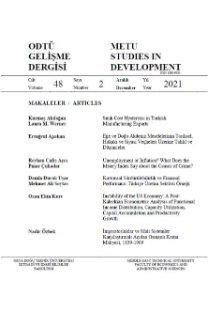The effect of the global financial crisis on household income, inequality and poverty in Turkey
Küresel finansal krizin Türkiye'de hane geliri, gelir dağılımı ve yoksulluk üzerindeki etkileri
___
- ARAN, M. (2013), "Welfare Impact of the Global Financial Crisis of 2008-2009 on Turkish Households", Ekonomi-Tek 2(1), 13-52.
- BALKAN, B., BAŞKAYA, Y.S. and TÜMEN, S. (2014), "Evaluating the Impact of the Post-2008 Employment Subsidy Program in Turkey", Central Bank of the Republic of Turkey, Working Paper 14/14, Ankara.
- CHEN, S. and RAVALLION, M. (2010), "The Developing World is Poorer than we Thought, But no Less Successful in the Fight Against Poverty", Quarterly Journal of Economics, 125(4), 1577-1625.
- CİLASUN, S.M. and KIRDAR, G.M. (2013), "Household Structure and Household Income and its Components over the Life-Cycle in Turkey", İktisat, İşletme ve Finans, 28(328), 89-116.
- DAYIOĞLU, M. and DEMİR-ŞEKER, S. (2014), "Social Policy and the Dynamics of Child Poverty in Turkey". Middle East Technical University, mimeo.
- DEATON, A. (2010), "Price Indexes, Inequality, and the Measurement of World Poverty", American Economic Review, 100 (1), 5-34.
- ERCAN, H., TAYMAZ, E. and YELDAN, E. (2010), Crisis and Turkey: Impact Analysis of Crisis Response Measures, ILO, Ankara.
- FALLON, P.R. and LUCAS, E.B. (2002), "The Impact of Financial Crises on Labor Markets, Household Incomes, and Poverty: A Review of Evidence" The World Bank Research Observer 17(1), 21-45.
- GASIOR, K. and LELKES, O. (with ZOLYOMI, E.) (2013), "Poverty, Inequality, and the Social Impact of the Financial Crisis in Latvia", European Centre for Social Welfare Policy and Research, Vienna.
- GÜRSEL, S. and İMAMOĞLU, Z. (2011), "Why is Agricultural Employment Increasing in Turkey?", BETAM Working Paper Series No. 4, Bahçeşehir University, Turkey.
- GROSH, M., BUSSOLO, M. and FREIJE, S. (2014) (eds.), Understanding the Poverty Impact of the Global Financial Crisis in Latin America and the Caribbean, Directions in Development, World Bank, Washington DC.
- İŞKUR (2011) 2011 Faaliyet Raporu, Ankara.
- JENKINS, S.P., BRANDOLINI, A., MICKLEWRIGHT, J. and NOLAN, B. (2013a), The Great Recession and the Distribution of Household Income, Oxford University Press, UK.
- JENKINS, S.P., BRANDOLINI, A., MICKLEWRIGHT, J. and NOLAN, B. (2013b), "The Great Recession and Its Consequenecs for Household Incomes for 21 Countries" in The Great Recession and the Distribution of Household Income, Jenkins, S.P., Brandolini, A., Micklewright, J. and Nolan, B (eds.), Oxford University Press, UK.. Chapter 2: 33-89.
- JENKINS, S.P., BRANDOLINI, A., MICKLEWRIGHT, J. and NOLAN, B. (2013c), "Summary and Conclusions" in The Great Recession and the Distribution of Household Income, Jenkins, S.P., Brandolini, A., Micklewright, J. and Nolan, B (eds.), Oxford University Press, UK, Chapter 9: 234- 248.
- JENKINS, S. P. (1999), "Analysis of Income Distributions", Stata Technical Bulletin, 48: 4-18. Reprinted in Stata Technical Bulletin Reprints, 8: 243-60.
- KOYUNCU, M. and ŞENSES, F. (2004), "Kısa Dönem Krizlerin Sosyoekonomik Etkileri: Türkiye, Endonezya ve Arjantin Deneyimleri", Middle East Technical Univesity, ERC Working Papers in Economics 04/13.
- MINISTRY OF DEVELOPMENT - REPUBLIC OF TURKEY (2014), 2015 Annual Program, Ankara.
- MINISTRY OF FAMILY AND SOCIAL POLICIES - REPUBLIC OF TURKEY (2015), Sosyal Yardımlarda Dönüşüm: Sosyal Devletin Yeniden İnşası, General Directorate of Social Assistances.
- SEN, A. (1997), On Economic Inequality. Clarendon Press, Oxford.
- SHORROCKS, A. F. (1982), "Inequality Decomposition by Factor Components", Econometrica, 50 (1): 193-211.
- ŞENSES, F. (1999), Yoksullukla Mücadele ve Sosyal Yardımlaşma ve Dayanışmayı Teşvik Fonu, METU Studies in Development, 26(3-4), 427-51.
- ŞENSES, F. (2003), "Economic Crises as an Instigator of Distributional Conflict: The Turkish Case in 2000-2001", Turkish Studies 4(2), 92-119
- TAYMAZ, E. (2009), "Informality and Productivity: Productivity Differentials between Formal and Informal Firms in Turkey", Middle East Technical University, mimeo.
- TURKSTAT (TURKISH STATISTICAL INSTITUTE) (2008-2012a), Press Release: Marriage and Divorce Statistics, Ankara.
- TURKSTAT (2008-2012b), Press Release: Birth Statistics, Ankara.
- TURKSTAT (2014), Press Release: Results of Poverty Study, Ankara.
- TURKSTAT (2015), Household Labor Force Surveys, web-data base, Ankara.
- OECD (2013), Development Co-operation Report 2013: Ending Poverty, OECD Publishing.
- UYGUR, E. (2010), "The Global Crisis and the Turkish Economy", TEK Discussion paper, 2010/3.
- WORLD BANK (2000), Turkey: Economic Reforms, Living Standards and Social Welfare Study, Report No. 20029-TU, Washington, D.C.: World Bank.
- WORLD BANK (2003), Turkey: Poverty and Coping After Crises, Report No. 24185-TR, Washington, D.C.: World Bank.
- WORLD BANK (2011), The Job Crisis: Household and Government Responses to the Great Recession in Eastern Europe and Central Asia, Washington DC: The World Bank.
- WORLD BANK (2013), Turkey Managing Labor Markets Through the Economic Cycle, Report No. 70130-TR, Ankara.
- ISSN: 1010-9935
- Yayın Aralığı: Yılda 3 Sayı
- Başlangıç: 2018
- Yayıncı: ODTÜ İİBF
Çağdaş tarım sorunu ve yeni köylülük
Gökhan YILMAZ, DÜRDANE ŞİRİN SARAÇOĞLU
The world into the 21st century: Globalization, market capitalism and sustainability
Friedrich List & Joseph Schumpeter: Strange bedfellows in the pedigree of (development) economics?
Time poverty and the poverty of economics
Türkiye'de kredi genişlemesinin sektörel dönüşüm üzerine etkisi
Raif CAN, Hüseyin GÜNAY, Mustafa KILINÇ
The effect of the global financial crisis on household income, inequality and poverty in Turkey
Sırma Demir ŞEKER, MELTEM DAYIOĞLU TAYFUR
2002 Sonrası Türkiye ekonomisinin performansı: Karşılaştırmalı bir analiz
Ahmet BENLİALPER, HASAN CÖMERT, Güney DÜZÇAY
Do regional trade agreements actually increase Turkey's foreign trade?
